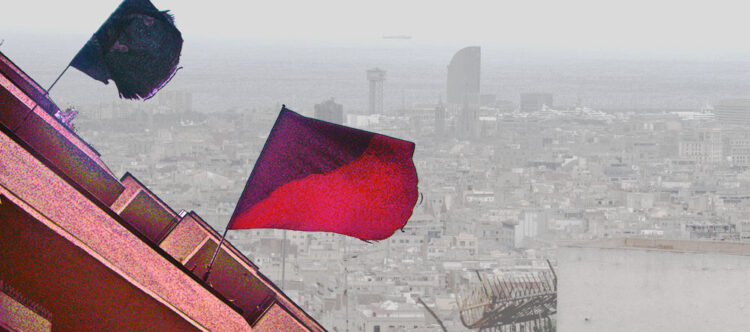Go to the “Topics & inputs” BAB2025 webpage: https://bab2025.espivblogs.net/topics-inputs/
In the context of the capitalist crisis and intense repression, we watch our cities submitting to the business of tourism and increasingly accommodating activities mediated by commodities and profit. This is a form of enclosure of public space, that displaces people from the cities. Squats are being evacuated and it is becoming increasingly difficult to secure our material conditions of existence for social centres. Yet the existence of social centres is vital for the sustainability of relationships of solidarity between people trying to breathe in a suffocating world. We consider it necessary for such projects to meet and exchange experiences and thoughts, as well as to create networks on the basis of mutual support.
Against the backdrop of the ever-increasing state repression and control of every aspect of our lives, of increasing devaluation, touristification and gentrification of our cities and neighborhoods, squats and social centres are constantly targeted by the powers that be. State repression, combined with the penetration of the logic of profit and commodification into every sphere of social life and everyday life, aims at the enclosure and shrinkage of public and free space in cities, whose character is changing. In this context, squats are targeted by the powers that be, primarily for what they stand for and create beyond and against capital and the state.
Squats, and the structures created by the movement in general, are not just spaces of freedom and air in the suffocating daily life imposed by modern totalitarianism, they’re also fertile grounds for people to come together, organise, and strengthen our collective struggle against the corrupt, oppressive system, as well as against the apathy and resignation that the system tries to breed. They are tools of the movement, grounding our struggles in specific places and nurturing a libertarian culture through the example of self-organisation, and, through this, they are spreading our message into the wider social sphere. In other words, these spaces are where we live and create in common, where we come together politically, and where we organise our social and class-based resistance against the state-capitalist system that brings destruction, hatred, and death. To put it simply, squats are prefigurations of the world we’re fighting to build, a world of equality, solidarity, freedom, and justice.
Moreover, squats as a tool in social struggles has played a crucial role in Greece, strengthening autonomous movements and the radical currents within the struggle, especially in student and youth movements. On one hand, squats totally disrupt the functioning of a workspace or educational space, and on the other, they become a center of struggle. A meeting point is created, offering space for relationships of solidarity and mutual aid to develop. Daily life takes on a different rhythm, allowing people to connect beyond their usual roles or identities. For this reason, we understand that defending squats is about all of us who are suffocating in this world that devalues us. It’s about the importance they hold, here and now, as spaces where a wider community can come together, and the possibilities they open for our struggles.
After the greek minister of public order Chrysochoidis’ ultimatum in 2019, and especially in the post-pandemic era, the way we defend squats has shifted dramatically. In the past, evictions were framed as a major political event for the state. For the movement, though, they were also a moment to showcase how deep the state’s repression really went and an opportunity to highlight how much social support the movement had. This situation made clear how important squats are in the social struggle and sparked new initiatives for occupation. But sometimes, defending a squat felt more symbolic, like a political statement, without necessarily keeping the building. In those moments, continuing a squat became less about maintaining the space and more about preventing an eviction: how to gain enough social legitimacy to stop plans for gentrification, so the state couldn’t afford an eviction.
Today, squats may not always make headlines as major political events, but defending each occupied space has become a crucial local battle. From Chania and Heraklion to the center of Athens, the past four years have seen a wave of successful re-occupations. In a time of aggressive tourism development, urban enclosures, and the dismantling of grassroots structures, every occupied building takes on deep significance for its city. Now, an eviction doesn’t mark the end of a squat but signals the beginning of a new cycle of resistance, where the fight isn’t just for the building itself but for the relationships, networks, and communities that have been built within it.
But this doesn’t mean that each squat should have to face this battle alone. In this context, we see it as essential to come together, share experiences and perspectives, and build connections between these projects. Creating a network of mutual support isn’t just a possibility, it’s a necessity.
So, we invite you to join the discussions on this topic.
To start, we ask that within the next month (March), you send a brief presentation outlining your perspectives on the key points raised in this text, whether broadly on the topics discussed or more specifically on the practices of squatting, defending, and reclaiming spaces. The goal is to build a collective understanding through the BAB2025 working group, gathering and sharing the experiences and insights of squats across Greece and the Balkans. These discussions will bring together squats from across the region, making this an important opportunity for connection, knowledge exchange, and strengthening networks of mutual support, especially given the particular significance of these struggles in the Balkan region.
No matter what, we look forward to your participation in the discussions taking place from May 15-18 at BAB2025 in Thessaloniki!
Go to the “Topics & inputs” BAB2025 webpage: https://bab2025.espivblogs.net/topics-inputs/

